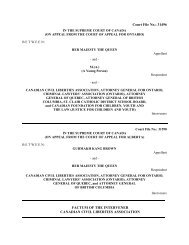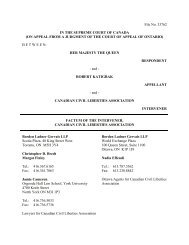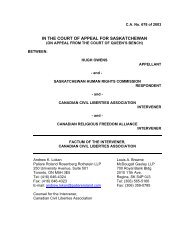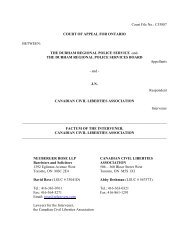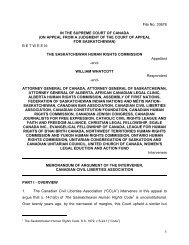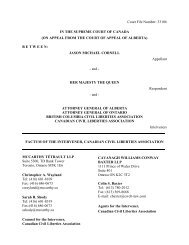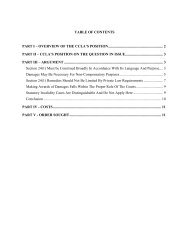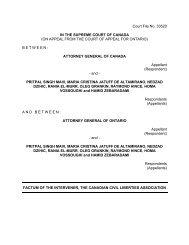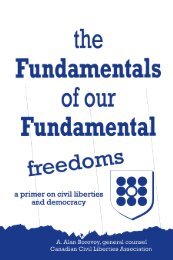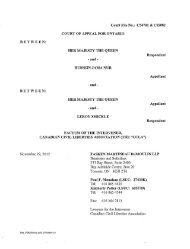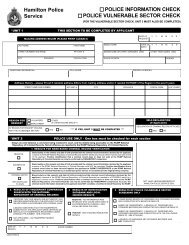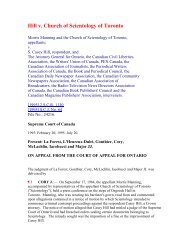KNOW YOUR RIGHTS - Canadian Civil Liberties Association
KNOW YOUR RIGHTS - Canadian Civil Liberties Association
KNOW YOUR RIGHTS - Canadian Civil Liberties Association
- No tags were found...
Create successful ePaper yourself
Turn your PDF publications into a flip-book with our unique Google optimized e-Paper software.
<strong>KNOW</strong> <strong>YOUR</strong> <strong>RIGHTS</strong>A Citizen’s Guide to Rights When Dealing With Police<strong>Canadian</strong> <strong>Civil</strong> <strong>Liberties</strong> <strong>Association</strong>
<strong>KNOW</strong> <strong>YOUR</strong> <strong>RIGHTS</strong>When dealing with the police, it is important to know what yourrights are. This pamphlet is designed to provide you with informationabout what you must do, what you do not have to do,and what you may wish to do in situations involving the police.What if I am stopped by the police?Police officers can stop you underthree general circumstances 1 :1. If they suspect that you have committeda crimeIf you have been involved in a caraccident, and the police ask youquestions about the accident, youcould be charged with an offence ifyou do not provide any answers. 22. If they see you committing acrime3. If you are drivingIf the police do not arrest you or ifthey do not have grounds to detainyou, they must let you be onyour way. To find out if you areunder arrest or detention, politelyask the officers, “Am I under arrest?”If they say yes, you can askwhy. Alternatively, you may askthe officer “Am I free to go?”, and ifthe answer is no, ask “why not?”Do I have to answer their questions?The police are allowed to approachyou and ask you questions.In most cases, you do not have toanswer their questions if you don’twant to. However, it is always agood idea to be polite.If you are detained by the police,they must inform you that you cantalk with a lawyer and provide youwith an opportunity to do so. Itmay be a good idea to not answerquestions from the police untilyou have spoken with a lawyer.Anything you say to the policecould be used as evidence incourt. Under some circumstances,statements that you are requiredby law to provide, such as accidentreports, cannot be used againstyou, but this rule is not absolute. 3What if the police ask who Iam?If stopped by the police, they willlikely ask for your name and address.They may also ask you foridentification. In most cases, youare not required to provide this information.CCLA1 ACLC
However, if you lie about yourname or address you may becharged with obstructing justiceor obstructing the police. 4If you are stopped while driving,the police may ask to see yourdriver’s licence, car registrationand insurance. You are requiredto provide this information, andif you fail to do so you may becharged with an offence. 5If you are riding a bicycle, and thepolice see you commit an offence(such as failing to stop at a redlight), they can stop you. 6 If asked,you must provide your name andaddress to the police in these circumstances.7 They can arrest youif you refuse to do so. 8What if I am stopped by the police while driving?The police can stop cars at anytime to determine if a driver hasconsumed alcohol or drugs, tosee whether a car is mechanicallyfit, to check whether a driver hasa valid licence, or to make sure adriver has insurance. 9 The policemay also stop your car if they suspectthat you have committed adriving offence. 10If the police ask to see your driver’slicence, car registration and insurance,you are required by law toproduce these documents. 11 Ifany of these documents are in theglove compartment, tell the officerthat you are reaching for thedocument before doing so.Can the police check to see if Ihave been drinking alcohol?If the police suspect that you havebeen drinking alcohol, they canmake you do a roadside breathtest. They can also ask you to doCCLA2 ACLC
a physical sobriety test, such aswalking in a straight line, on theside of the road. 12 You do not havea right to speak to a lawyer beforetaking a roadside test. 13If the police have reasonablegrounds to suspect that you havemore alcohol in your blood thanthe legal limit, or that your abilityto drive has been affected byCan the police search my car?If your car has been stopped bythe police to check your sobriety,the mechanical condition of thecar, or your licence, registrationor insurance, the police cannotsearch your car. They are, however,allowed to look in the windows ofyour car, and may use a flashlightto do this if it is nighttime. 16alcohol, they can take you to thepolice station to do a breath test,sometimes called a “breathalyzertest”. 14 You do have the right tospeak to a lawyer before taking abreath test at a police station. 15The police are only allowed tosearch your car if they have reasonableand probable grounds tobelieve that there are illegal drugsor alcohol or evidence relating tothe commission of a crime in thecar. They must also believe that theevidence, drugs or alcohol wouldbe removed or destroyed if theywere to get a search warrant. 17CCLA3 ACLC
When can the police search me?In most cases, the police can onlysearch you only if you have beenplaced under arrest or if you haveconsented to the search. However,there are exceptions. Theseinclude:1. If the police find you in a placewhere they are searching for drugs,and they have reason to believe thatyou have drugs. 18If the police search you for any ofthese reasons, you must allow thesearch. If you believe that youhave been wrongly searched, tellthe police that you object to thesearch, and speak to a lawyer afterwardsabout your concerns.2. The police find you in a vehiclewhere people are transporting ordrinking alcohol illegally, and theybelieve that you have alcohol. 193. The police believe that you havean illegal weapon or one that wasused to commit a crime, and suspectthat it might be removed or destroyedin the time it would take toget a search warrant. 20If the police search you in relationto one offence, and find evidencethat you may have committedanother offence, you can becharged in relation to the secondoffence. 21For example, if they search youon suspicion of having drugs, butfind an illegal weapon, you can becharged with possession of the illegalweapon.CCLA4 ACLC
What if I am detained?The police have a right to brieflydetain you if they are investigatinga crime and have reasonablegrounds to believe that you areconnected to that crime. 22 Thistype of detention is different frombeing placed under arrest.If you have been detained but notarrested, and a police officer believesthat there are reasonablegrounds to think that his safety orthe safety of others is at risk, theofficer may do a “pat-down” searchof you to check for weapons. 23If you are being detained, you donot have to answer any questionsposed by the police.What if I am arrested?If you are placed under arrest,the police may search you, yourclothes and anything you are carrying.They can also search your“immediate surroundings”, 24 whichcould include your car if that iswhere you are arrested. 25The police are allowed to searchyou after you have been arrestedas long as they believe that thesearch is necessary for the safetyof the police and the public, toprotect evidence from destruction,or to discover evidence thatmay relate to your guilt or innocence.26What are my rights if I am arrested?The <strong>Canadian</strong> Charter of Rightsand Freedoms, which is part ofCanada’s constitution, sets out therights that individuals have whenthey have been arrested.Will the police tell me why I amunder arrest?You have the right to be informedpromptly of the reason for your arrest.If you are unsure, you shouldpolitely ask the police officer whyyou are being arrested.Do I have to speak to the policeif I am arrested?If you are arrested, you have theright to remain silent. This meansthat you do not have to answerany questions asked by the police.Can I speak to a lawyer?Once you are arrested, you havea right to speak to a lawyer, andthe police must advise you of thisright as soon as possible. The policemust also tell you about LegalAid and your right to free legal services.27CCLA5 ACLC
If you wish to contact a lawyer, thepolice must provide you with atelephone. 28 They must also allowyou to make more than one phonecall in order to reach a lawyer, ifnecessary. 29 The police must alsostop questioning you until youhave been given an opportunityto contact a lawyer. 30 You havethe right to speak to a lawyer inprivate. 31Once you have spoken to yourlawyer, the police may continueto ask you questions. You do nothave to answer these questions.What if the police come to my home?The police are allowed to come toyour home to talk to you, but youare not generally required to answertheir questions or grant themaccess to your home.When can the police enter myhome?There are a number of circumstancesin which the police are allowedto enter your home. Theseinclude:1. The police have a warrant to enteryour home to arrest someone2. The police have a search warrant3. The police have permission fromyou or someone else in authority inyour home4. There are urgent circumstancesthat require the police to enter yourhomeThe police may also enter yourhome if they suspect that a crimehas been committed in relationto property in your home. In thiscase, the suspected criminal activitymust have been committedagainst you, not by you. 32What are my rights if the policehave a warrant?A search warrant allows the policeto search your home and take certainitems that they find. Policeare allowed to take items that youare not legally allowed to have,such as illegal drugs, or items thatmay be evidence of an offence. 33If the police take something thatwas legally in your possession,they are generally required to returnit to you within 3 months. 34 Ifit is not returned to you, contactthe police.CCLA6 ACLC
If the police come to your homewith a search warrant, they mustidentify themselves and ask permissionto come in. If they havea valid search warrant, you mustlet them in. If you refuse, they mayenter your home without permission.35 If you try to prevent themfrom coming into your home, youmay be charged with obstructingthe police. 36In most cases, the police must alsoshow you a copy of the warrant. 37If they do not offer to show youthe warrant, you can ask them tosee it. Make sure that the informationon the warrant is correct.For example, check that the correctname and address are listedand see if there are any time limitsabout when the police can use thewarrant.In what urgent circumstancescan the police enter my home?The police can enter your homewithout your permission in the followingurgent circumstances:• A 911 call has been made fromyour home, and the police believethat entry is necessary to preventdeath or serious injury. 39• Where the police believe thatsomeone in the home is in need ofemergency services. 40• To help someone who has reporteda domestic assault to safely removetheir belongings. 41• To protect people from injury if thepolice suspect that there is a druglaboratory in the home. 42The police are expected to actreasonably in their search. Thismeans that they are not allowedto use excessive force or damageproperty for no reason. 38This pamphlet contains general information only. It is not a substitutefor legal advice and is not intended to replace legal advice froma qualified lawyer. Persons seeking legal advice or guidance with aparticular problem should consult with a qualified lawyer.CCLA7 ACLC
How do I make a complaint about the police?RCMPCommission for Public Complaints Againstthe RCMP (CPCRCMP)The CPC is responsible for investigatingall complaints against RCMP officers anywherein Canada.Telephone: 1-800-665-6878; TTY 1-866-432-5837Mail: 7337 137 Street, Suite 102, Surrey,BC, V3W 1A4E-mail: org@cpc-cpp.gc.caWebsite: http://www.cpc-cpp.gc.ca/Complaints can be made aboutpolice policies, services or the conductof particular police officers,and will generally be dealt with accordingto strict timelines. In mostprovinces and with the RCMP, aperson does not need to be thevictim of misconduct or a <strong>Canadian</strong>citizen to submit a complaint.Many provinces and the RCMPhave independent agencies set upto investigate police complaints.In other provinces, individuals arefirst required to complain directlyto the police chief in charge of theofficer involved. In these jurisdictions,complainants will usuallyhave the opportunity to appealthe chief’s response to an externalbody. The websites of the policecomplaints agencies listed belowgenerally provide greater detailon the complaints process.British ColumbiaOffice of the Police Complaint Commissioner(OPCC)BC’s OPCC handles all complaints againstpolice in the province which do not involvethe RCMP.Telephone: In Victoria (250) 356-7458; inVancouver (604) 660-2385; toll free 1-800-663-7867Mail: 3rd Floor - 756 Fort Street, PO Box9895, Stn. Prov. Govt., Victoria, BC, V8W9T8E-mail: info@opcc.bc.caWebsite: http://www.opcc.bc.ca/AlbertaTo file a complaint about the actions of anon-RCMP police officer in Alberta, youmay contact either the province’s PublicComplaint Director, or the chief of thepolice department for which the officer(s)involved in the complaint is employed.If an individual is unsatisfied with the responseto his or her complaint, they mayappeal to Alberta’s Law Enforcement ReviewBoard.Website: https://www.solgps.alberta.ca/programs_and_services/public_security/law_enforcement_oversight/policing_oversight_complaints/Pages/default.aspxCCLA8 ACLC
SaskatchewanPublic Complaints CommissionThe Public Complaints Commission dealswith complaints against police that do notinvolve the RCMP.Telephone: In Regina (306) 787-6519; inSaskatoon (306) 964-1450; toll free 1-866-256-6194Mail: In Regina 300-1919 SaskatchewanDr., Regina, SK, S4P 4H2; in Saskatoon 3rdAvenue North, Saskatoon, SK, S7K 2H6Website: http://www.justice.gov.sk.ca/publiccomplaintscommissionManitobaLaw Enforcement Review Agency (LERA)The LERA investigates complaints againstpolice officers in Manitoba not involvingthe RCMP.Telephone: In Winnipeg (204) 945-8667;toll free 1-800-282-8069Mail: 420-155 Carlton Street, Winnipeg,Manitoba, R3C 3H8E-mail: lera@gov.mb.caWebsite: http://www.gov.mb.ca/justice/lera/complaint.htmlOntarioOffice of the Independent Police Review Director(OIPRD)The OIPRD handles complaints againstpolice in Ontario, including the OntarioProvincial Police (OPP), which relate toincidents on or after October 19, 2009.(To complain about incidents which tookplace before October 19, 2009, contactthe Ontario <strong>Civil</strong>ian Police Commissionhttp://www.ocpc.ca/.)Telephone: In Toronto (416) 246-7071; tollfree 1-877-411-4773; TTY 1-877-414-4773Mail: 655 Bay Street, 10th Flr., Toronto, Ontario,M7A 2T4E-mail: oiprd@ontario.caWebsite: https://www.oiprd.on.ca/cms/QuebecPolice Ethics/Déontologie policièreMade up of a Police Ethics Commissioner,who receives and examines complaints,and a Police Ethics Committee, whichhears appeals of those complaints, thePolice Ethics system handles complaintsabout all law enforcement officers in Quebec.Telephone: In Quebec (418) 643-7897; inMontreal (514) 864-1784; toll free 1-877-237-7897Mail: In Montréal 454 place Jacques-Cartier, 5th Flr., Montréal, QC, H2Y 3B3; inQuebec 1200 route de l’Église, bur. 1-40,Québec, QC, G1V 4Y9E-mail: deontologie-policiere.quebec@msp.gouv.qc.caWebsite: http://www.deontologie-policiere.gouv.qc.ca/index.php?id=75&L=1Nova ScotiaPolice Complaints CommissionNova Scotia’s Police Complaints Commissioner’sOffice investigates complaints allegingmisconduct by non-RCMP policeofficers in the province.Telephone: (902) 424-3246Mail: 1550 Bedford Highway, suite 720, POBox 1573, Halifax, NS, B3J 2Y3E-mail: polcom@gov.ns.caWebsite: http://www.gov.ns.ca/just/Policing_Services/complaints.aspNew BrunswickNew Brunswick Police CommissionInvestigates complaints related to theconduct of municipal and regional policeofficers in New Brunswick.Telephone: (506) 453-2069Mail: City Centre, Suite 202, 435 KingStreet, Fredericton, NB, E3B 1E5E-mail: nbpc@gnb.caWebsite: http://www.gnb.ca/0075/indexe.aspCCLA9 ACLC
Prince Edward IslandOffice of the Police CommissionerPEI is in the process of establishing its Officeof the Police Commissioner, which isexpected to begin receiving complaintsinvolving municipal police officers directlyfrom the public on March 1, 2010,at which time information on the PoliceCommissioner’s role and the complaintsprocess will become available on the Internet.Newfoundland & LabradorRoyal Newfoundland Constabulary PublicComplaints CommissionThe RNC Complaints Commission investigatescomplaints against officers of theRoyal Newfoundland Constabulary.Telephone: (709) 729-0950Mail: Suite E-160 Bally Rou Place, 280 TorbayRd., St. John’s, NL, A1A 3W8E-mail: RNCComplaintsCommission@gov.nl.caWebsite: http://www.justice.gov.nl.ca/rncpcc/Northwest Territories, Yukon & NunavutThe Territories are policed by the RCMP– see the contact information above forthe Commission for Public ComplaintsAgainst the RCMP.CCLA 10 ACLC
End notes1 This is taken from Police Powers: Stops and Searches, online: Community Legal Education Ontario < http://www.cleo.on.ca/english/pub/onpub/PDF/criminal/polpower.pdf>.2 Highway Traffic Act, R.S.O. 1990, c. H.8., s. 199, 200.3 R. v. White (1999), 24 C.R. (5th) 201 (S.C.C.).4 See e.g. R. v. Harry, [2003] O.J. No. 2022 (S.C.J.).5 See Compulsory Automobile Insurance Act, R.S.O. 1990, c. C.25, s. 3(3).6 Highway Traffic Act, R.S.O. 1990, c. H.8., s. 218(1).7 Highway Traffic Act, R.S.O. 1990, c. H.8., s. 218(2).8 Highway Traffic Act, R.S.O. 1990, c. H.8., s. 218(4).9 R. v. Ladouceur (1990), 77 C.R. (3d) 110 (S.C.C.).10 Highway Traffic Act, R.S.O. 1990, c. H.8., s. 216(1).11 Highway Traffic Act, R.S.O. 1990, c. H.8, ss. 7(5) and 33; and Compulsory Automobile Insurance Act, R.S.O. 1990, c. C.25,s. 3(1).12 Criminal Code, R.S.C. 1985, c. C-46, s. 254.13 R. v. Orbanski (2005), 196 C.C.C. (3d) 481 (S.C.C.).14 Criminal Code, R.S.C. 1985, c. C-46, s. 254.15 R. v. Therens, [1985] 1 S.C.R. 613.16 R. v. Mellenthin (1992), 76 C.C.C. (3d) 481 (S.C.C.).17 James A. Fontana & David Keeshan, The Law of Search & Seizure in Canada, 7th ed. (Markham: LexisNexis Canada Inc.,2007), at p. 603.18 Controlled Drugs and Substances Act, S.C. 1996, c. 19.19 Liquor Licence Act, R.S.O. 1990, c. L.19, s. 32(5).20 Criminal Code, R.S.C. 1985 c. C-46, s. 117.02, s. 117.04.21 R. v. Duong (2007), 240 B.C.A.C. 104 (B.C.C.A.).22 R. v. Mann (2004), 21 C.R. (6th) 1 (S.C.C.).23 R. v. Mann (2004), 21 C.R. (6th) 1 (S.C.C.).24 Cloutier v. Langlois (1990), 74 C.R. (3d) 316 (S.C.C.).25 R. v. Caslake (1998), 13 C.R. (5th) 1 (S.C.C.).26 R. v. Caslake (1998), 13 C.R. (5th) 1 (S.C.C.).27 R. v. Bartle (1994), 74 C.R. (3d) 129 (S.C.C.).28 R. v. Manninen (1987), 58 C.R. (3d) 97 (S.C.C.).29 R. v. Pavel (1989), 74 C.R. (3d) 195 (Ont. C.A.).30 R. v. Manninen (1987), 58 C.R. (3d) 97 (S.C.C.).31 R. v. Jones (1999), 133 C.C.C. (3d) 1 (Ont. C.A.).32 R. v. Mulligan (2000), 142 C.C.C. (3d) 14 (Ont. C.A.).33 James A. Fontana & David Keeshan, The Law of Search & Seizure in Canada, 7th ed. (Markham: LexisNexis Canada Inc.,2007), at pp. 167-68.34 Criminal Code, R.S.C. 1985, c. C-46, s. 490.35 Eccles v. Bourque (1974), 19 C.C.C. (2d) 129 (S.C.C.); R v. Feeney (1997), 115 C.C.C. (3d) 129 (S.C.C.). See also SusanneBoucher & Kenneth Landa, Understanding Section 8: Search, Seizure, and the <strong>Canadian</strong> Constitution (Toronto: Irwin LawInc., 2005).36 Criminal Code, R.S.C. 1985, c. C-46, s. 129.37 Criminal Code, R.S.C. 1985, c. C-46, s. 29.38 R. v. Genest (1989), 45 C.C.C. (3d) 385 (S.C.C.); R. v. Gogol (1994), 27 C.R. (4th) (Ont. Prov. Div.).39 R. v. Godoy (1997), 115 C.C.C. (3d) 272 (Ont. C.A.), aff’d (1998), 131 C.C.C. (3d) 129 (S.C.C.).40 R. v. Wu (2008), 249 B.C.A.C. 311 (B.C.C.A.).41 R. v. Sanderson (2003), 64 O.R. (3d) 257 (C.A.).42 R. v. Jamieson (2002), 166 C.C.C. (3d) 501 (B.C.C.A.).<strong>Canadian</strong> <strong>Civil</strong> <strong>Liberties</strong> <strong>Association</strong>l’<strong>Association</strong> canadienne des libertés civiles#506-360 Bloor St. WestToronto, ON M5S 1X1E-mail: mail@ccla.orgWebsite: www.ccla.orgCCLA 11 ACLC



